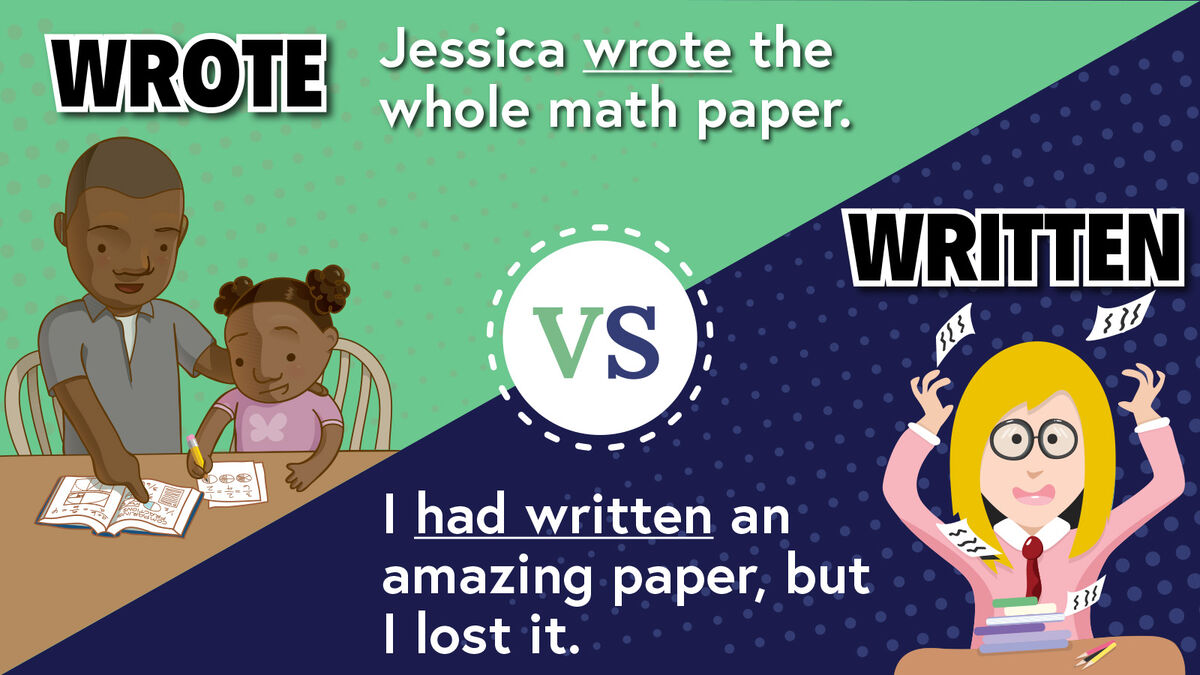
Do you know when to use "written" or "wrote"? You are not alone. Learn how to decide which word to use through fun examples and simple explanations. Then, you’ll have a clear idea of whether that paper was "written" or "wrote."
Written vs. Wrote: The Difference
It’s "written" there. It’s "wrote" there. Which one do you use? Knowing when and where to use “written” vs “wrote” is a battle that even some advanced English speakers don’t quite understand.
It’s always best to start with the basics. “Written” and “wrote” are both forms of the verb "to write."
- Wrote is the simple past tense of "to write."
- Written is the past participle of "to write."
So, what do simple past tense and past participle mean? That is where you'll find the answer to using "written" or "wrote" correctly.
Wrote: Simple Past Tense
Writing is never easy. But if you "wrote" something like "I wrote a letter," that means the action of writing happened in the past. "Wrote" also clarifies that it is completely finished. For example, if I "wrote a book," that book is now complete. To really nail this concept down, here are some example sentences.
- We wrote our paper for English together.
- Terry wrote this for you.
- He wrote the computer program for you.
- I didn’t know that he wrote that.
- Jessica wrote the whole math paper.
- Can you believe she wrote that essay?
You’ll notice that "wrote" always comes after the noun of the sentence. Beyond just being past tense, this can be a way to know when to use "wrote" vs. "written."
Using Written in a Sentence
"Written" isn’t as simple as "wrote" because you can use "written" a few different ways in a sentence. The fun thing about past participles is that they can make perfect tenses and they can be used as adjectives, too. But, what does that all mean? Explore each usage case deeper with lots of examples.
Written Used in Perfect Verb Tenses
When you use "written" to make perfect verb tenses, you'll pair it with an auxiliary verb like "had" or "have." Check out a few sentence examples.
Past perfect tense shows writing that happened in the past and is finished. It typically includes "had."
- I had written an amazing paper, but I lost it.
- They had written our paper in 10 minutes, and it showed.
- He had written an amazing agenda, but it was changed.
- There were so many poems that he had written.
- How he had written all those works, I’ll never know.
Present perfect tense shows writing that is happening now or writing that will continue. It typically includes "has" or "have."
- The computer has written so much amazing code.
- I have written 10 poems today.
- She has written several papers in class.
- Joanne has written five short stories this year.
- He has written it so many times.
Future perfect tense demonstrates future writing endeavors with a definite end date. It uses the "will have" construction.
- Matteo will have written the instruction manual by then.
- By the time we arrive, Aneta will have written her opening remarks.
- They will have written their wedding vows.
- James will have written a complete anthology when this last book is done.
- She will have written a series of poems on nature.
You’ll notice that the verb tense of the auxiliary verb is in the past, present or future tense, depending on the perfect verb tense you are trying to create.
Written Becomes an Adjective
Perfect tense was interesting, but "written" is a word of my masks, including that of an adjective. You can use "written" as an adjective to show something expressing or involving writing. Don’t believe it? Just look at how it is used in these sentence examples!
- You need to improve your written communication skills.
- I have a written record of it.
- I thought the exam was oral, not a written test.
- Where is the written work for your exam?
- The written instructions conflict with what the instructor told me to do.
It’s All About Tense
"Wrote" and "written" can certainly get confusing. However, if you try to remember the verb tense that they take, then things will be a lot clearer. Now that you’ve read all the written words on this page that I wrote, you might want to check out verb phrase examples. You’re well on your way to becoming a grammar master!